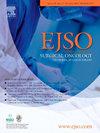Enhanced recovery for cytoreductive surgery and hyperthermic intraperitoneal Chemotherapy: An international survey to assess acceptance and feasibility
IF 3.5
2区 医学
Q2 ONCOLOGY
引用次数: 0
Abstract
Background
Enhanced Recovery After Surgery (ERAS) protocols have markedly improved outcomes after colorectal and other major surgery, suggesting benefits also for complex surgeries like Cytoreductive Surgery and Hyperthermic Intraperitoneal Chemotherapy (CRS-HIPEC). This study investigates the adoption and acceptance of the recent ERAS recommendations for CRS-HIPEC within expert centers.
Methods
Clinicians from 16 expert centers across 9 countries were invited to answer an online survey inquiring about current clinical practice. Adoption of the 72 ERAS items from the recent dedicated guidelines were evaluated using a Likert-type scale with focus on preoperative, perioperative, and postoperative phases.
Results
Overall, 27 clinicians (11 female, 21 surgeons, 2 gynecologists and 4 anesthesiologists/intensivists) participated, with high adoption of ERAS protocols at baseline (67 %). More than half of the guideline items (54 %) were widely adopted. However, despite nearly 18 % intending to change their practices, there remains substantial resistance to further adoption, such as for measures like alcohol cessation programs, mechanical bowel preparation, and oral antibiotic decontamination. Barriers identified include resource limitations(20 %), perceived irrelevance (17 %) for specific patient groups, unclear benefits (59 %), and restrictive policies (5 %).
Conclusion
The study shows that most ERAS principles are routinely implemented in CRS-HIPEC surgeries, despite significant challenges with specific components and complex processes. Future research will focus on generating additional evidence and streamlining ERAS guidelines to prioritize essential elements.
提高细胞减少手术和腹腔内热化疗的恢复:一项评估接受度和可行性的国际调查
手术后增强恢复(ERAS)方案显著改善了结直肠癌和其他大手术后的预后,也表明复杂手术如细胞减少手术和腹腔高温化疗(CRS-HIPEC)也有益处。本研究调查了专家中心对最近ERAS推荐的CRS-HIPEC的采用和接受情况。方法邀请来自9个国家16个专家中心的临床医生回答一项关于当前临床实践的在线调查。采用最近专用指南中的72个ERAS项目,使用李克特量表对术前、围手术期和术后阶段进行评估。结果共有27名临床医生(11名女性,21名外科医生,2名妇科医生和4名麻醉/重症医师)参与,在基线时ERAS方案的采用率很高(67%)。超过一半(54%)的指南项目被广泛采用。然而,尽管有近18%的人打算改变他们的做法,但在进一步采用戒酒计划、机械肠道准备和口服抗生素去污等措施方面仍存在很大阻力。确定的障碍包括资源限制(20%),特定患者群体的感知不相关性(17%),不明确的益处(59%)和限制性政策(5%)。结论研究表明,尽管存在特定成分和复杂过程的重大挑战,但大多数ERAS原则在CRS-HIPEC手术中常规实施。未来的研究将集中于产生更多的证据和简化ERAS指南,以优先考虑基本要素。
本文章由计算机程序翻译,如有差异,请以英文原文为准。
求助全文
约1分钟内获得全文
求助全文
来源期刊

Ejso
医学-外科
CiteScore
6.40
自引率
2.60%
发文量
1148
审稿时长
41 days
期刊介绍:
JSO - European Journal of Surgical Oncology ("the Journal of Cancer Surgery") is the Official Journal of the European Society of Surgical Oncology and BASO ~ the Association for Cancer Surgery.
The EJSO aims to advance surgical oncology research and practice through the publication of original research articles, review articles, editorials, debates and correspondence.
 求助内容:
求助内容: 应助结果提醒方式:
应助结果提醒方式:


